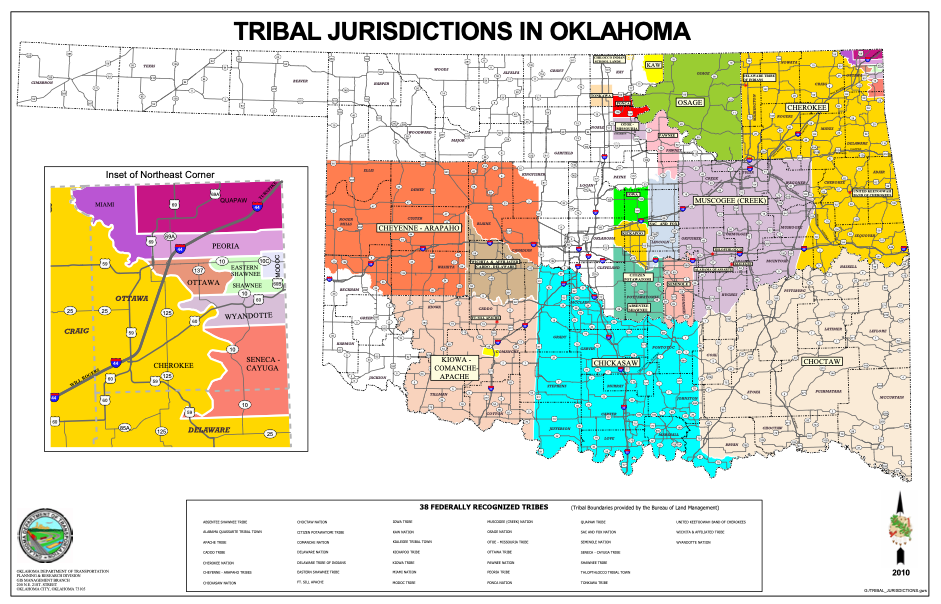The U.S. Supreme Court will take a fresh look at a landmark case involving government jurisdiction on tribal lands after more than 40 petitions were made seeking to overturn or limit the historic 2020 ruling in McGirt v. Oklahoma.
Justices will gather early next month with a focus on a Tulsa man’s case, according to a Dec. 8 update to the court’s docket. The state appealed following an Oklahoma Court of Criminal Appeals decision to vacate a 2017 conviction and 35-year prison sentence for Victor Manuel Castro-Huerta, 36, based on the McGirt ruling.
The state appeals court contended with Castro-Huerta’s testimony that Oklahoma did not have jurisdiction to prosecute him because the victim was a member of a federally recognized tribe, noting that the crime happened within the bounds of the non-disestablished Cherokee Nation reservation. The logic used in the McGirt ruling has been applied to five other tribes.
Oklahoma Republican Gov. Kevin Stitt and Attorney General John O’Connor have vehemently opposed the July 2020 McGirt ruling and a state court ruling that followed, which voided Oklahoma’s criminal jurisdiction in a significant portion of the eastern part of the state when a case involves a member of a federally recognized tribe.
NEW OKLAHOMA ATTORNEY GENERAL REQUESTS SUPREME COURT TO OVERTURN LANDMARK TRIBAL SOVEREIGNTY RULING

“No recent decision of this court has had a more immediate and destabilizing effect on life in an American State than McGirt v Oklahoma,” a team of lawyers for the state wrote in its opening appeals statement in the case of Oklahoma v. Bosse.
The primary focus of the Castro-Huerta, Bosse, and other appeals is whether the highest court should overturn its 2020 ruling or, to a lesser extent, find that Oklahoma should have concurrent jurisdiction in cases that involve nonnative Americans committing crimes against Native Americans in Indian Country.
“Numerous crimes are going uninvestigated and unprosecuted, endangering public safety,” O’Connor told the Washington Examiner in August. The attorney general added that the McGirt decision “now drives thousands of crime victims to seek justice from federal and tribal prosecutors whose offices are not equipped to handle those demands.”
Advocates for appealing the McGirt decision have cited examples such as a 19-year prison sentence for a manslaughter charge placed on Richard Ray Roth, who was driving his vehicle through Wagoner, Oklahoma, in 2013 when he hit an 11-year-old Cherokee boy on a bike. Roth did not immediately call emergency services and instead drove home to get his wife and returned to the scene.
Roth claimed he only had two beers despite his blood alcohol level registering nearly four times the legal limit, investigators said. Still, his case was overturned in September, with his release stayed pending a state appeal to the Supreme Court.
“This case cannot be retried in federal court,” a dissenting state judge wrote, “and Roth will likely go free without further punishment and without so much as a traffic ticket on his record for the events in this case.”
Some tribes within Oklahoma have spoken out against O’Connor and the numerous petitions against the ruling, such as Cherokee Nation Principal Chief Chuck Hoskin Jr., who accused petitioners of attempting to enforce an “anti-Indian political agenda.”
The 5-4 McGirt ruling was authored by conservative-leaning Justice Neil Gorsuch, who was joined by four Democratic appointees, including the late Ruth Bader Ginsburg.
Now that Justice Amy Coney Barrett, a nominee of former President Donald Trump, is in place of Ginsburg, state petitioners are hoping to at least weaken McGirt despite the long-awaited affirmation of tribal sovereignty after decades of high court losses and broken treaty promises among indigenous groups.
Despite justices signaling they will examine the appeal brought before them by Oklahoma, the likelihood of the Supreme Court taking up the case is slim, given that the court receives up to 8,000 petitions each term and grants hearing and oral argument in around 80 of such petitions.
CLICK HERE TO READ MORE FROM THE WASHINGTON EXAMINER
A ruling on whether to grant petitions a hearing could be determined as early as Jan. 10.
The Washington Examiner contacted the Oklahoma Attorney General’s Office but did not receive a response.
